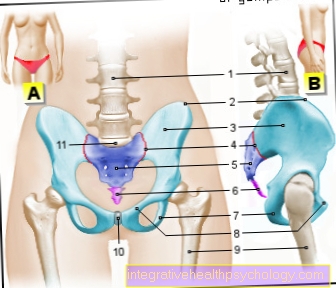Alpha-1 antitrypsin
introduction
Alpha-1-antitrypsin is one of the protein structures, i.e. proteins that swim in the blood serum. The name comes from the research used to identify these proteins. At a Serum protein electrophoresis these proteins are in the alpha-1 group.
Alpha-1-antitrypsin is an antagonist of trypsin, an enzyme that breaks down proteins. This trypsin, which is harmful in the blood, is thus inhibited by alpha-1 antitrypsin. Since alpha-1-antitrypsin not only inhibits trypsin, but also other enzymes, it is also called a protease inhibitor.
More information can be found here: Trypsin

Role, functions and uses of alpha-1-antitrypsin
Alpha-1-antitrypsin is an inhibitor for protein-splitting enzymes. It belongs to the proteins of the Serpin familywhich are encoded on the Serpine genes.
Protein-splitting enzymes such as trypsin are important aids in digestion, while these are harmful in the blood. Serum proteins in the blood that the body needs can be destroyed and this is prevented by alpha-1-antitrypsin.
Serum proteins are a large group of different proteins that can be divided into different subgroups in studies. You have, among other things Tasks in the immune defense and the Blood clotting of the body. Most of these proteins are produced in the liver. A increased degradation by enzymes would have many harmful consequences for the people.
Since it's not just trypsin, the more general name is protease inhibitor. In addition to alpha-1 antitrypsin, there are many other protease inhibitors. Proteases are also part of blood clotting and many other processes in the body.
Protease inhibitors can also used medicinally become. Certain thrombin inhibitors, i.e. substances that prevent blood clotting, can be used as prophylaxis for heart attacks. Drugs from the field of protease inhibitors can also be used for some viral diseases.
The amount of alpha-1 antitrypsin in the blood increases when the body becomes infected. As part of the acute phase reaction, alpha-1-antitrypsin is increasingly formed and can thus reduce an excessive immune reaction and the effect of the neutrophils, which would otherwise lead to the destruction of the body's own elastin.
A mutation in the Serpine genes can lead to defective alpha-1 antitrypsin, which enriched in the body and has so many harmful consequences for those affected.
Furthermore, the deficiency in alpha-1 antitrypsin itself has many consequences, as blood clotting and the immune system develop disorders. The genetic disease is particularly widespread in northwestern Europe.
So far, alpha-1-antitrypsin cannot be produced artificially. However, it can be extracted from the blood serum of healthy people and concentrated to help with a deficiency. Alpha-1-antitrypsin has far-reaching functions in the human body and a deficiency has far-reaching consequences.
What are the normal alpha-1-antitrypsin values?
Alpha-1-antitrypsin can be determined in the blood. The normal range is between 83 and 199 milligrams per deciliter. An increase does not have to be pathological, but can also occur during pregnancy. A normal range is always a pure statistic. Not every person whose values are different is automatically sick. Some people have different values throughout their lives and never show symptoms. Such a laboratory value can only serve as a supporting diagnosis and not as the sole basis of a diagnosis.
What does the rapid test measure?
A rapid test can be used to detect an abnormal variant of alpha-1 antitrypsin. This variant cannot fulfill its normal function and thus effectively leads to an alpha-1 antitrypsin deficiency. The test works with a simple blood sample from the fingertip and the result is available after a few minutes.
However, with the test only the presence of this faulty variant is excluded will and not generally the deficiency disease.
Also read the article: The Alpha-1 Antitrypsin Test.
Where is Alpha-1 Antitrypsin Made?
Alpha-1-antitrypsin is produced in the human liver and then exits through the blood. Alpha-1-antitrypsin is coded on the genes of the Serpine group on the fourteenth chromosome. The genes are read in the liver cells and translated into amino acids by the ribosomes. The amino acid chain then has to be folded appropriately so that alpha-1-antitrypsin is formed. During inflammatory reactions, the liver cells become more active and the production of many substances, including alpha-1-antitrypsin, is increased.
What happens with an alpha-1 antitrypsin deficiency?
An alpha-1 antitrypsin works through two different systems.
- One consequence is the adhesion of the defective alpha-1-antitrypsin at the place of origin. The faulty protein accumulates in the liver and the liver can no longer adequately perform its other tasks. This can lead to severe liver damage, liver cirrhosis, in newborns. Affected people are often dependent on a donor organ. Cirrhosis of the liver can lead to liver cancer as well as loss of liver function.
- The result of this clumping in the liver cells is a deficiency of alpha-1 antitrypsin in the rest of the body. This is the second cause of symptoms in the genetic disorder. Usually, alpha-1 inhibits antitrypsin Elastase, trypsin, chymotrypsin, thrombin and Plasmin. Overactivity of these enzymes has many consequences. An increased amount of elastase leads to a breakdown of the elastin in the alveoli, which destroys them and the affected person develops pulmonary emphysema. Therefore, those affected are often mistakenly identified with a chronic bronchitis diagnosed. One treatment consists of replacement therapy with alpha-1 antitrypsin and therapy for the symptoms. The liver damage only occurs in about twenty percent of those affected, while the lung damage always persists after a longer course of the disease.
Read about it too: Alpha-1 antitrypsin deficiency
Causes of an increase in the antitrypsin level
Elevated levels of alpha-1 antitrypsin in the blood or stool can have different causes. Not all causes can be assessed as pathological.
- During pregnancy, women often have higher alpha-1 antitrypsin levels because of hormone changes.
- An artificial hormone change as part of an estrogen therapy can also lead to an increase.
- An increase in the level of alpha-1-antitrypsin in the stool indicates one Permeability of the intestinal mucosa. This can indicate allergies or a gluten intolerance or occur in the context of acute or chronic bowel inflammation.
- The alpha-1-antitrypsin level in the blood increases when there is inflammation in the body as part of the acute phase reaction.
- Alpha-1 antitrypsin also rises in tumor diseases, especially in bronchial carcinoma. The alpha-1-antitrypsin in the Long-term control used as a tumor marker become.
An increase is therefore usually an acute change and not, like the deficiency, genetic. The changes are variable and usually go back independently.
Alpha-1 antitrypsin in stool
The non-specific protease inhibitor alpha-1-antitrypsin is found in the blood of all people. Alpha-1 antitrypsin is increased in inflammatory reactions. If the intestinal mucosa is permeable, alpha-1-antitrypsin can be lost and alpha-1-antitrypsin can be detected in the stool.
In this way, the quality of the intestinal mucosa can be checked without biopsies and other invasive measures. Such damage to the intestinal mucosa can have different causes. Elevated values are possible with allergic reactions and gluten intolerance. Even with chronic inflammation of the bowel, such as Ulcerative colitis or Crohn's disease, increased values are possible.
In acute cases of intestinal inflammation, alpha-1 antitrypsin can also be detected. However, stool thinning from diarrhea can result in falsely low values. In chronic intestinal inflammation, alpha-1 antitrypsin can be used for long-term control of the disease. The normal range of alpha-1 antitrypsin is at below 0.27mg per gram of stool. In some cases, the loss through the stool can also lead to deficiency symptoms in the rest of the body.
Consequences of an altered antitrypsin level
The rise in alpha-1 antitrypsin itself has hardly any negative consequences for the body and is a normal response to abnormal processes in the body. The change in the value is an indication of possibly pathological processes in the body, which in turn lead to disease symptoms. In this case, further diagnostics should be done to find the reason for the increase.
Alpha-2 antitrypsin
Alpha-2-antitrypsin does not exist in this form. However, in the Gel electrophoresis, which gives the alpha-1-antitrypsin its name, also an alpha-2 fraction. Proteins, which can be found in this fraction, are increased during various inflammatory reactions in the body. Some of these proteins belong to the acute phase proteins. Can be the cause of an increase Tissue necrosis, acute Infections, Autoimmune diseases, inflammatory Bowel disease and Tumors be. So the increase is often similar to the increase in the alpha-1 fraction. The increase is particularly strong in one nephrotic syndrome, since it is a relative value and the other proteins are lost through the diseased kidney. Lowered values can be found at Liver damage and one increased blood loss.
Recommendations from our editorial team
- Alpha-1 antitrypsin deficiency
- Trypsin
- Chymotrypsin - What Is It Important For?
- Role of enzymes in the human body





























